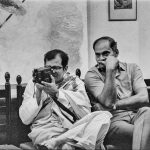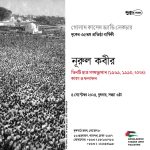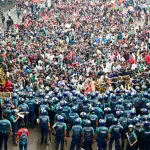Standing in the grand parliament building in Karachi, built by his grandfather, veteran Pakistani MP Qamar Zaman reflected on the irony of it all. He had long campaigned against the militarization in Pakistan, but recent developments in Bangladesh worried Zaman. ?They saw what went wrong in the Pakistani experiment and decided to fine tune it? he lamented. The election commissioner in India, SY Quraishi, repeated the sentiment. Bangladesh following in Pakistan?s footsteps was not something he welcomed. Kunda Dixit, in Kathmandu, talked of how the same blueprint was being used in all our countries. Despite the rhetoric of democracy, the militarization of South Asian countries was the flavour of the day. Aided by chaotic situations created by political mismanagement, the anti-corruption Trojan Horse brought in its deadly military content.
As in Troy, the people had welcomed them with open arms. Years of mismanagement and corruption had worn down their patience. People wanted respite, regardless of where it came from. This was just the window the military needed. Not wanting to lose out on the lucrative UN placements, they needed a mask. The ?neutral? caretaker government was the perfect foil. The arrests of corrupt politicians, businesspeople and godfathers provided a much needed relief. Few worried about the flimsy, and sometimes concocted accusations used to reel them in. None dared to speak of the glaring omissions. Curbing media freedom took care of the main obstacle. The military or the Jamaat were strangely absent from the list. Amongst the largest and most controversial deals made during previous regimes were the MIG and the Frigate purchases. Yet neither had featured in the cases being investigated. ?kaker mangsho kak khai na.? (A crow doesn?t eat crow?s meat).
After much foot dragging, and over two months of delay, a one member body was asked to probe into the death of adivasi activist Choles Ritchil in the most gruesome killing while in military custody. The Shadarghat launch disaster, in contrast, had three separate investigation committees ordered to submit reports within 24 hours. Choles on the other hand had resisted a multimillion dollar deal to take over adivasi land. It was a different ball game.
Tasneem Khalil was one voice that they had not been able to silence. His incisive, well researched investigations flew against the culture of silence that prevailed. Mahfuz Anam, the editor of the leading English daily, The Daily Star, had proudly told me, ?In all these years, not a single story had been spiked.? That was some time ago. Things were different now. The story of military involvement that Tasneem had revealed was pulled back from the press in the last minute. A commentator on the roundtable at Drik on the 3rd May, International Press Freedom Day, had equated the Daily Star and the Daily Prothom Alo with a new political party. The newspapers had elaborate reporting on the US ambassador's love for democracy and a free press. The Drik roundtable, featuring some of the bravest journalists working in the land, went unreported. The roundtable had discussed the military, the corporate deals taking place, the heavy hand of foreign countries. It talked of deals being pushed through in the absence of dissent. Tasneem had deliberately not been asked to speak. That would be inviting trouble.
That didn?t protect Tasneem for long. In my room in Shangri La Hotel in the early hours of this morning I received an SMS from a student. Tasneem had been picked up from his home. This is a risk that all journalists speaking against the?government are prepared to take, but given what Choles Ritchil went through, this arrest is more ominous. A suicide note for an epitaph is too likely an outcome to let the system take its course.
Shahidul Alam
Kathmandu
11th May 2007
From SAJA list:
Daily Star reporter (formerly with New Age), and CNN Dhaka stringer, Tasneem Khalil was picked up by men in plain clothes @ midnight, claiming to be from "Joint Forces"/Army.
Tasneem Khalil Picked Up By "Joint Forces" CNN Reporter Picked Up Tasneem's Blog Tasneem, We'll Come Get You http://salamdhaka.blogspot.com/ Human Rights Watch Issues Alert Tasneem on Choles Ritchil Case Tasneem on Modhupur Tasneem quoted in Washington Post Sabash Bangladesh!




Leave a Reply
You must be logged in to post a comment.